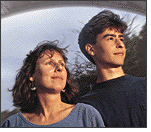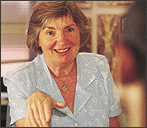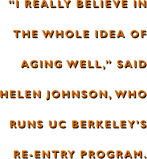

When 17-year old Berkeley student Ben Young jams with Disinfectant -- his industrial rock band -- a door slams shut across the hall. Rosemary Young, also a Berkeley student, wants quiet in the house. She slips in an opera CD and returns to her books.
 As housemates, these two students make an odd couple. Her jeans fit, his sag. She drives a minivan, he rides a bike. She has four children. He, well, he's one of her children.
As housemates, these two students make an odd couple. Her jeans fit, his sag. She drives a minivan, he rides a bike. She has four children. He, well, he's one of her children.
That's right. Rosemary Young, 36, is Ben's mom. These days, such family affairs are bound to happen on college campuses. Students of middle-age or more have tripled across the nation since 1970.
In the United States, nearly 20 percent of all participants in higher education are now over age 35. Statistics are even more dramatic for the entire population of re-entry students -- those over the age of 25 -- who now comprise more than 40 percent of U.S. college classes.
But don't think Rosemary Young is typical of the lot. No re-entry student is, said Helen Johnson. She runs Berkeley's Re-Entry Program, which helps students come back to college after an absence of five years or more.
"At 18, we're more alike," said Johnson. "At 30 or 40 or 50, we're more unalike because of all our different life experiences. So, it's hard to generalize."
On one end of the spectrum, there's Mona Freye. In 1994, when she was 78, she made national headlines graduating from Berkeley with a bachelor's degree in English.
"Cal is one of the greatest things that ever happened to me," she said at the time. "It's something I'd always wanted to do, and I felt very inadequate without an education."
"Grandma Moses, Beethoven, a lot of people have done their best work in later years," said re-entry coordinator Johnson.
"Aging has always been something people feared in this country, but I see that changing. When I was young, I thought I'd be in a rocking chair at my age," said Johnson, 61, "but now retirement isn't even on my horizon."
Fortunately, education is a revolving door.
"People can come in and out as the need arises," she said. "In many other parts of the world, this isn't the case. People there think students should get their education and get on with their lives."
Compared to Freye, Rosemary Young is just a spring chicken. But both women have two things in common: courage and confidence.
"They have to be willing to take a risk," said Johnson. "They are competing with the most prepared younger students they could find anywhere."
As was Freye, Young is an English major. She lives in El Cerrito with her husband, Sam, who is a 1982 Berkeley graduate, and their four children: Joseph, six; Johnny, 10; Jaime, 12; and Ben.
Ben Young hopes to one day be an engineer. He is on campus this semester as an honors student allowed special enrollment at Berkeley in his senior year of high school. As the first months of the semester roll by, he's learning the ropes.
"But I don't think he can even understand what it's like for me to go to school," said his mother. "He's so focused on academics, and he doesn't have to remember the school appointments and the doctor appointments and when to give the next dose of medicine and who has an art project due. When you're a parent, you do these things one after another. To me, it's such a pleasure to be in school and to sit down and think about something for three hours straight without all the distractions."
"Many re-entry students face almost impossible obstacles," said Johnson, "but their desire to get an education is so great, they are able to push past barricades."
Johnson is charged with lowering those barriers. Her program starts with monthly community workshops that explain how to get into Berkeley. Subsequent offerings include study skills courses, peer advising and other services that span the years to graduation.
But is college tougher just because you've put on a few years? After all, Berkeley isn't about running the 100-yard dash.
In some ways, yes, said Johnson. First off, take finances. Forty-year-olds cannot rely on doting parents to foot those college bills. And it's a lot easier to survive on pizza slices and hit the sack on a sofa when you're 18.
Then throw in dependents. Many of us accumulate a few of those over the years, Johnson said. If not four kids like Rosemary, perhaps an aging parent or disabled spouse needs care.
As if that weren't enough, Johnson has another thought. How many of your friends are you willing to lose?
"Relationships go through changes because Berkeley is a transformational experience," Johnson said. "Sometimes the support isn't there for returning to school. We do see a lot of marriages go under. Even relationships with parents and friends often change. People tell me their friends ask them why they are spending so much time studying and why are they taking on all this stress. Sometimes these students are in tears about it, that the people in their lives don't seem to understand."
But if there are friends to be lost, there are friends to be gained, and new relationships do form, said Johnson.
The reason older students can cope with all these transitions and still pull down grades on par with their younger peers -- as re-entry students do at Berkeley -- has to do with the strengths they bring to campus.
"We're getting the theory, but we've already had the application," explained senior philosophy major Raymond Banks, 42. "So maybe it comes easier that way."
Talk to re-entry students and one theme will echo again and again -- their motivation is different in both quality and quantity from that of the 18-year-olds surrounding them.
"I think when you go back to school after being out for years, your motives are better for being there," said Rosemary Young. "Better skills, no; maybe a little more discipline. But the biggest difference is my desire to learn."
Half a lifetime ago, as a freshman, Young walked away from Berkeley. Then she spent years regretting it.
"But I don't regret it now," she said. "I think things happen for a reason. I don't think there was a time until the present when I would have gotten so much out of a Berkeley education. It's challenging, now, but not insurmountable. Most of all, the challenges are of my own choosing."
Though she wouldn't say education is generally wasted on the young, she feels it was for her.
When she first enrolled at Berkeley, Young was 18 and fresh out of high school. "I had no interest in learning, I had no discipline," she said. "A few weeks into the second quarter, I had a paper due for an English class. I had spent hours and hours staring at a blank page with no progress at all, and I didn't know what to do. So, I decided I would drop out of school."
She lifted her hands and shrugged, saying, "I didn't have to write the paper."
Now, she is doing well in school and wants to write those papers and read those books.
"Age is an asset, definitely," said Young. "There's such a difference in attitude. I hear things young students say sometimes that I am just so amused by. For instance, I went to a lecture, and it was so good, I could see paying a lot of money to get to talk to this woman, the speaker, afterwards. Some people did go up to talk with her. But I heard some kids saying, 'kiss butt,' 'just trying to make good grades.' I was disappointed for them. It's not about that at all. But I would probably have thought that, too, when I was their age."
Her son, who is their age, begs to differ.
"It's probably more a liability to be like my mom than like me," he said. "She's out of practice and not used to school anymore. If you're older, you're probably more responsible, but you don't relate as well to the other students."
And there's the rub: his mother doesn't think socializing is important.
"My life is full," she said. "If I were lonely, then I might be sad if I couldn't connect on campus. But when you have four kids and a husband in your life, you don't feel the same compulsion to seek out social activities. I talk to students in my classes and so forth, but socializing with them is really not part of my life."
The urge to study and run is common among re-entry students, said Johnson. She encourages them to take the time to savor their college experience, because that's also what education is about.
Johnson often has an uphill battle, however, convincing older students like Young to work with their classmates.
"I tried to meet with a couple of other students to study for a midterm, but I found it was not a good use of my time," said Young. "The pace was very slow, and there was a lot of chit chat. One of the students said she hadn't done any of the reading."
Not so fast, said Johnson. "Regardless of what anyone else in the group has done," she said, "if you find yourself in the role of communicating and teaching the material, studies show you learn it better."
All in all, she said, older students are a very demanding population.
"They question things more. Many older students are used to wielding power in business and at home. When they come to Berkeley, they don't leave that behind, and when they see something that doesn't make sense to them, they don't put up with it," she said.
Roger Doering, a re-entry graduate student in engineering, came back to school after he was bored to tears by retirement. Of course, he did retire early -- at age 38 -- after making himself independently wealthy in business. He said he's savvy to what it takes to succeed at Berkeley.
"I know how to work the system," he said. "The politics of a campus, while they're different from an industry situation, call for the same skills."
Such confidence can be intimidating, especially for teaching assistants in their twenties who are used to being looked up to and not challenged by their 18-year-old charges.
"TAs can be more problematic for re-entry students," said Johnson. "Oftentimes, they will be intimidated. We've had a few extreme examples, where re-entry students say, 'The class is not right for me, I know too much.'"
Since teaching assistants come from a variety of backgrounds, and many haven't yet worked as teachers, "it's more likely they haven't developed the sensitivity to older students the same way the faculty have," Johnson said.
Re-entry students may be reaping more than just a degree by returning to class. It turns out that going to school could be the ticket for saving our aging brain cells.
Berkeley Integrative Biology Professor Marian Diamond, who lugs a brain around in a hat box as a teaching tool -- she's world-renowned for her work on the brain -- has proven that the right environment can help keep thought processes in good order. She prescribes plenty of mental stimulation, and she's taking her own advice.
Diamond, who already has her full complement of academic degrees, is going in another direction. At 71, she's learning to play the piano.
by Kathleen Scalise
![]()


[Table of Contents] [Berkeley Magazine Home] [UC Berkeley Home Page]
Copyright 1998, Regents of the University of California. All rights reserved.
Comments? E-mail ucbwww@pa.urel.berkeley.edu.